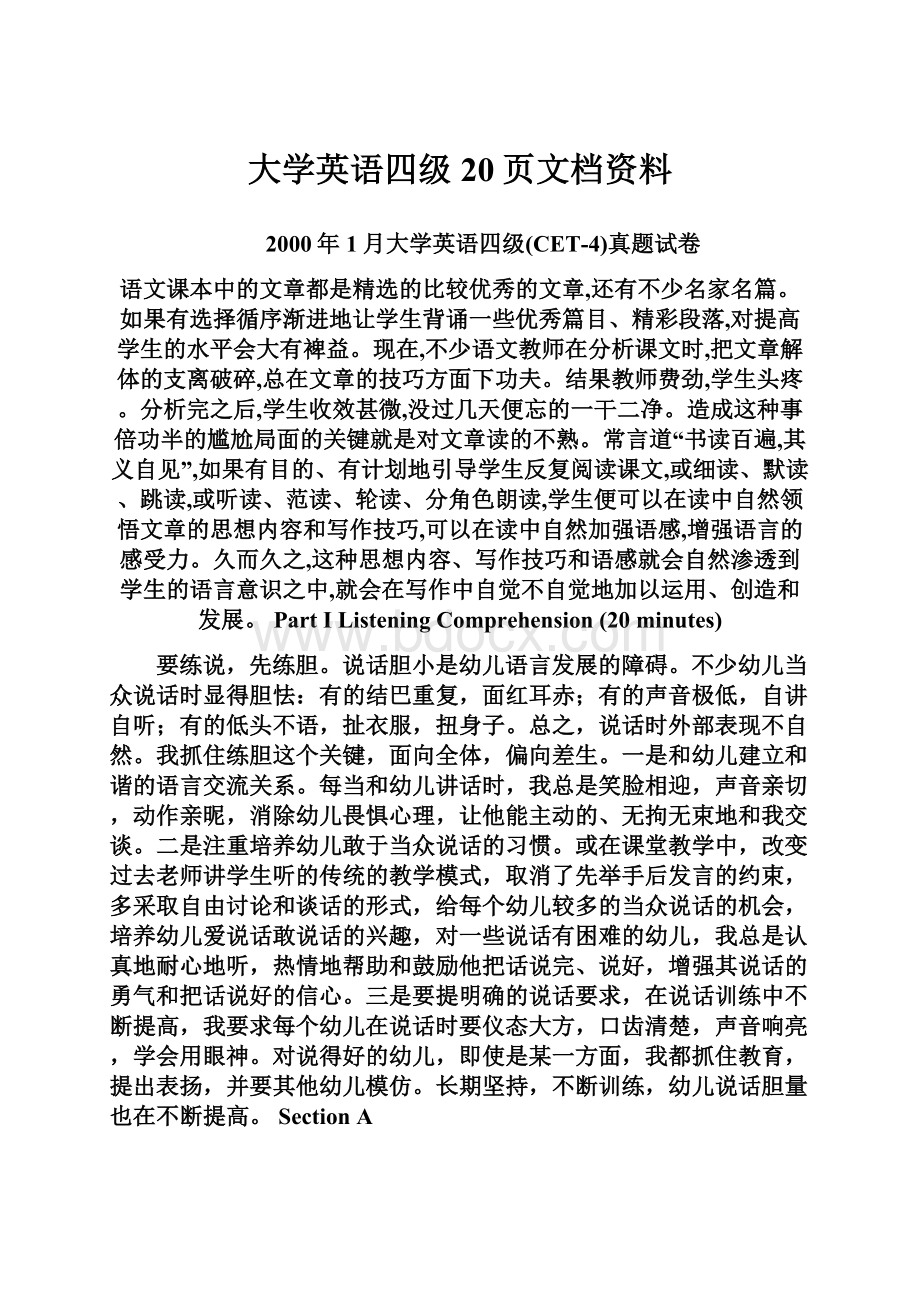大学英语四级20页文档资料.docx
《大学英语四级20页文档资料.docx》由会员分享,可在线阅读,更多相关《大学英语四级20页文档资料.docx(25页珍藏版)》请在冰豆网上搜索。

大学英语四级20页文档资料
2000年1月大学英语四级(CET-4)真题试卷
语文课本中的文章都是精选的比较优秀的文章,还有不少名家名篇。
如果有选择循序渐进地让学生背诵一些优秀篇目、精彩段落,对提高学生的水平会大有裨益。
现在,不少语文教师在分析课文时,把文章解体的支离破碎,总在文章的技巧方面下功夫。
结果教师费劲,学生头疼。
分析完之后,学生收效甚微,没过几天便忘的一干二净。
造成这种事倍功半的尴尬局面的关键就是对文章读的不熟。
常言道“书读百遍,其义自见”,如果有目的、有计划地引导学生反复阅读课文,或细读、默读、跳读,或听读、范读、轮读、分角色朗读,学生便可以在读中自然领悟文章的思想内容和写作技巧,可以在读中自然加强语感,增强语言的感受力。
久而久之,这种思想内容、写作技巧和语感就会自然渗透到学生的语言意识之中,就会在写作中自觉不自觉地加以运用、创造和发展。
PartIListeningComprehension(20minutes)
要练说,先练胆。
说话胆小是幼儿语言发展的障碍。
不少幼儿当众说话时显得胆怯:
有的结巴重复,面红耳赤;有的声音极低,自讲自听;有的低头不语,扯衣服,扭身子。
总之,说话时外部表现不自然。
我抓住练胆这个关键,面向全体,偏向差生。
一是和幼儿建立和谐的语言交流关系。
每当和幼儿讲话时,我总是笑脸相迎,声音亲切,动作亲昵,消除幼儿畏惧心理,让他能主动的、无拘无束地和我交谈。
二是注重培养幼儿敢于当众说话的习惯。
或在课堂教学中,改变过去老师讲学生听的传统的教学模式,取消了先举手后发言的约束,多采取自由讨论和谈话的形式,给每个幼儿较多的当众说话的机会,培养幼儿爱说话敢说话的兴趣,对一些说话有困难的幼儿,我总是认真地耐心地听,热情地帮助和鼓励他把话说完、说好,增强其说话的勇气和把话说好的信心。
三是要提明确的说话要求,在说话训练中不断提高,我要求每个幼儿在说话时要仪态大方,口齿清楚,声音响亮,学会用眼神。
对说得好的幼儿,即使是某一方面,我都抓住教育,提出表扬,并要其他幼儿模仿。
长期坚持,不断训练,幼儿说话胆量也在不断提高。
SectionA
“教书先生”恐怕是市井百姓最为熟悉的一种称呼,从最初的门馆、私塾到晚清的学堂,“教书先生”那一行当怎么说也算是让国人景仰甚或敬畏的一种社会职业。
只是更早的“先生”概念并非源于教书,最初出现的“先生”一词也并非有传授知识那般的含义。
《孟子》中的“先生何为出此言也?
”;《论语》中的“有酒食,先生馔”;《国策》中的“先生坐,何至于此?
”等等,均指“先生”为父兄或有学问、有德行的长辈。
其实《国策》中本身就有“先生长者,有德之称”的说法。
可见“先生”之原意非真正的“教师”之意,倒是与当今“先生”的称呼更接近。
看来,“先生”之本源含义在于礼貌和尊称,并非具学问者的专称。
称“老师”为“先生”的记载,首见于《礼记?
曲礼》,有“从于先生,不越礼而与人言”,其中之“先生”意为“年长、资深之传授知识者”,与教师、老师之意基本一致。
Directions:
Inthissection,youwillhear10shortconversations.Attheendofeachconversation,aquestionwillbeaskedaboutwhatwassaid.Boththeconversationandthequestionwillbespokenonlyonce.Aftereachquestiontherewillbeapause.Duringthepause,youmustreadthefourchoicesmarkedA),B),C)andD),anddecidewhichisthebestanswer.ThenmarkthecorrespondingletterontheAnswerSheetwithasinglelinethroughthecenter.
Example:
Youwillhear:
Youwillread:
A)Attheoffice.
B)Inthewaitingroom.
C)Attheairport.
D)Inarestaurant.
Fromtheconversationweknowthatthetwoweretalkingaboutsomeworktheywillstartat9o’clockinthemorningandhavetofinishat2intheafternoon.Therefore,D)“5hours”isthecorrectanswer.Youshouldchoose[D]ontheAnswerSheetandmarkitwithasinglelinethroughthecenter.
SampleAnswer[A][B][C][D]
1.A)Thewomanisaclosefriendoftheman.
B)Thewomanhasbeenworkingtoohard.
C)Thewomanisseeingadoctor.
D)Thewomanistiredofherwork.(C)
2.A)Thisapplepietastesverygood.
B)Hismotherlikesthepieverymuch.
C)Thispiecan’tmatchhismother’s.
D)Hismothercan’tmakeapplepies.(A)
3.A)Takeawalk.
B)Giveaperformance.
C)Listentothemusic.
D)Dancetothemusic.(D)
4.A)Readanarticleonpoliticalscience.
B)Presentadifferenttheorytotheclass.
C)Readmorethanonearticle.
D)Chooseabetterarticletoread.(C)
5.A)ThewomanwouldunderstandifshedidMary’sjob.
B)ThewomanshoulddothetypingforMary.
C)ThewomanshouldworkashardasMary.
D)Thewomanisn’taskillfultypist.(A)
6.A)HewantstomakeanappointmentwithMr.Smith.
B)HewantstomakesurethatMr.Smithwillseehim.
C)Hewantstochangethetimeoftheappointment.
D)Hewantsthewomantomeethimatthreeo’clock.(B)
7.A)Hegetsnervousveryeasily.
B)Heisaninexperiencedspeaker.
C)Heisanawfulspeaker.
D)Hehasn’tpreparedhisspeechwell.(B)
8.A)Shedidn’tlikethebooksthemanbought.
B)Therewasn’talargeselectionatthebookstore.
C)Themanboughtalotofbooks.
D)Shewantedtoseewhatthemanbought.(C)
9.A)Buyaticketforthetemo’clockflight.
B)Askthemantochangetheticketforher.
C)Gototheairportimmediately.
D)Switchtoadifferentflight.(D)
10.A)Dr.Lemoniswaitingforapatient.
B)Dr.Lemonisbusyatthemoment.
C)Dr.Lemonhaslosthispatience.
D)Dr.Lemonhasgoneouttovisitapatient.(B)
SectionB
Directions:
Inthissection,youwillhear3shortpassages.Attheendofeachpassage,youwillhearsomequestions.Boththepassageandthequestionswillbespokenonlyonce.Afteryouhearaquestion,youmustchoosethebestanswerfromthefourchoicesmarkedA),B),C)andD).ThenmarkthecorrespondingletterontheAnswerSheetwithasinglelinethroughthecenter.
Passageone
Questions11to14arebasedonthepassageyouhavejustheard.
11.A)Acaroutsidethesupermarket.
B)Acaratthebottomofthehill.
C)Paul’scar.
D)Thesportscar.(C)
12.A)Insidethecar.
B)Atthefootofthehill.
C)Inthegarage.
D)Inthesupermarket.(D)
13.A)Thedriverofthesportscar.
B)Thetwogirlsinsidethecar.
C)Themanstandingnearby.
D)ThesalesmanfromLondon.(A)
14.A)Nobody.
B)Thetwogirls.
C)Thebusdriver.
D)Paul.(A)
PassageTwo
Questions15to17arebasedonthepassageyouhavejustheard.
15.A)Hisfriendgavehimthewrongkey.
B)Hedidn’tknowwherethebackdoorwas.
C)Hecouldn’tfindthekeytohismailbox.
D)Itwastoodarktoputthekeyinthelock.(A)
16.A)Itwasgettingdark.
B)Hewasafraidofbeingblamedbyhisfriend.
C)Thebirdsmighthaveflownaway.
D)Hisfriendwouldarriveanytime.(B)
17.A)Helookedsillywithonlyoneleginsidethewindow.
B)Heknewthepolicemanwouldn’tbelievehim.
C)Thetorchlightmadehimlookveryfoolish.
D)Herealizedthathehadmadeamistake.(B)
PassageThree
Questions18to20arebasedonthepassageyouhavejustheard.
18.A)Thethreatofpoisonousdesertanimalsandplants.
B)Theexhaustionofenergyresources.
C)Thedestructionofoilwells.
D)Thespreadoftheblackpowderfromthefires.(D)
19.A)Theundergroundoilresourceshavenotbeenaffected.
B)Mostofthedesertanimalsandplantshavemanagedtosurvive.
C)Theoillakessoondriedupandstoppedevaporating.
D)Theundergroundwaterresourceshavenotbeenpolluted.(D)
20.A)Torestorethenormalproductionoftheoilwells.
B)Toestimatethelossescausedbythefires.
C)Toremovetheoilleftinthedesert.
D)Tousetheoilleftintheoillakes.(C)
PartIIReadingComprehension(35minutes)
Directions:
Thereare4passagesinthispart.Eachpassageisfollowedbysomequestionsorunfinishedstatements.ForeachofthemtherearefourchoicesmarkedA),B),C)andD).YoushoulddecideonthebestchoiceandmarkthecorrespondingletterontheAnswerSheetwithasinglelinethroughthecenter.
PassageOne
Questions21to25arebasedonthefollowingpassage.
Unlesswespendmoneytospotandpreventasteroids(小行星)now,onemightcrashintoEarthanddestroylifeasweknowit,saysomescientists.
Asteroidsarebiggerversionsofthemeteoroids(流星)thatraceacrossthenightsky.MostorbitthesunfarfromEarthanddon’tthreatenus.ButtherearealsothousandsofasteroidswhoseorbitsputthemonacollisioncoursewithEarth.
Buy$50millionworthofnewtelescopesrightnow.Thenspend$10millionayearforthenext25yearstolocatemostofthespacerocks.Bythetimewespotafatalone,thescientistssay,we’llhaveawaytochangeitscourse.
Somescientistsfavorpushingasteroidsoffcoursewithnuclearweapons.Butthecostwouldn’tbecheap.
Isitworthit?
Twothingsexpertsconsiderwhenjudginganyriskre:
1)Howlikelytheeventis;and2)Howbadtheconsequencesiftheeventoccurs.ExpertsthinkanasteroidbigenoughtodestroylotsoflifemightstrikeEarthonceevery500,000years.Soundsprettyrare—butifonedidfall,itwouldbetheendoftheworld.“Ifwedon’ttakecareofthesebigasteroids,they’lltakecareofus,”saysonescientist.“It’sthatsimple.”
Thecure,though,mightbeworsethanthedisease.DowereallywantfleetsofnuclearweaponssittingaroundonEarth?
“Theworldhaslesstofearfromdoomsday(毁灭性的)rocksthanfromagreatnuclearfleetsetagainstthem,”saidaNewYorkTimesarticle.
21.Whatdoesthepassagesayaboutasteroidsandmeteoroids?
A)Theyareheavenlybodiesdifferentincomposition.
B)Theyareheavenlybodiessimilarinnature.
C)Therearemoreasteroidsthanmeteoroids.
D)Asteroidsaremoremysteriousthanmeteoroids.(B)
22.WhatdoscientistssayaboutthecollisionofanasteroidwithEarth?
A)Itisveryunlikelybutthedangerexists.
B)Suchacollisionmightoccuronceevery25years.
C)CollisionsofsmallerasteroidswithEarthoccurmoreoftenthanexpected.
D)It’sstilltooearlytosaywhethersuchacollisionmightoccur.(A)
23.Whatdopeoplethinkofthesuggestionofusingnuclearweaponstoalterthecoursesofasteroids?
A)Itsoundspracticalbutitmaynotsolvetheproblem.
B)Itmaycreatemoreproblemsthanitmightsolve.
C)ItisawasteofmoneybecauseacollisionofasteroidswithEarthisveryunlikely.
D)Furtherresearchshouldbedonebeforeitisprovedapplicable.(B)
24.Wecanconcludefromthepassagethat________.
A)whilepushingasteroidsoffcoursenuclearweaponswoulddestroytheworld
B)asteroidsracingacrossthenightskyarelikelytohitEarthinthenearfuture
C)theworryaboutasteroidscanbelefttofuturegenerationssinceitisunlikelytohappeninourlifetime
D)workablesolutionsstillhavetobefoundtopreventacollisionofasteroidswithEarth(D)
25.Whichofthefollowingbestdescribestheauthor’stoneinthispassage?
A)Optimistic.
B)Critical.
C)Objective.
D)Arbitrary.(C)
PassageTwo
Questions26to30arebasedonthefollowingpassage.
Believeitornot,opticalillusion(错觉)cancuthighwaycrashes.
Japanisacaseinpoint.Ithasreducedautomobilecrashesonsomeroadsbynearly75percentusingasimpleopticalillusion.Bentstripes,calledchevrons(人字形),paintedontheroadsmakedriversthinkthattheyaredrivingfasterthantheyreallyare,andthusdriversslowdown.
NowtheAmericanAutomobileAssociationFoundationforTrafficSafetyinWashingtonD.C.isplanningtorepeatJapan’ssuccess.Startingnextyear,thefound